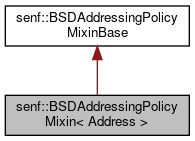Template for generic AddressingPolicy implementation based on the BSD socket API. More...
#include <senf/Socket/Protocols/BSDAddressingPolicy.hh>

Static Public Member Functions | |
| template<class SPolicy > | |
| static void | peer (SocketHandle< SPolicy > const &handle, Address &addr) |
| Return address of remote peer on connected sockets. More... | |
| static void | local (FileHandle const &handle, Address &addr) |
| Return local of socket. More... | |
| template<class SPolicy > | |
| static void | connect (SocketHandle< SPolicy > const &handle, Address const &addr) |
| Connect to remote host. More... | |
| static void | bind (FileHandle const &handle, Address const &addr) |
| Set local socket address. More... | |
Detailed Description
template<class Address>
struct senf::BSDAddressingPolicyMixin< Address >
Template for generic AddressingPolicy implementation based on the BSD socket API.
This template provides an implementation template to implement generic addressing policy classes which rely on the standard BSD socket API for their implementation (connect/bind/getsockname/getpeername).
The Address template parameter specifies the address type of the addressing policy. This type must have two members: sockaddr_p() and socklen(). The first must return a struct sockaddr * to the address, the second must return the size of the address in bytes. The pointer returned by sockaddr_p() must be non-const if called on a non-const address. The underlying socket address stored at that pointer might be modified.
This template class is inherited into addressing policy classes via private inheritance. Then the members supported by the respective addressing policy are made available via using declarations (See INet4AddressingPolicy for an Example).
- Idea:
- We could explicitly provide open_sockaddr_p() and close_sockaddr_p() members. sockaddr_p could always return a const * whereas open_sockaddr_p should return a non-const pointer. The close operation would then explicitly signal, that the new value should be incorporated into the class. With our current implementation, the close member would be a no-op, however this should free us from using the sockaddr values as a direct storage representation of the address.
Definition at line 75 of file BSDAddressingPolicy.hh.
Member Function Documentation
◆ bind()
|
static |
Set local socket address.
- Parameters
-
[in] handle socket handle [in] addr local socket address
◆ connect()
|
static |
Connect to remote host.
This member is only available if the socket handles communication policy is ConnectedCommunicationPolicy.
- Parameters
-
[in] handle socket handle [in] addr address of remote peer to connect to
◆ local()
|
static |
Return local of socket.
- Parameters
-
[in] handle socket handle to check [out] addr local socket address
◆ peer()
|
static |
Return address of remote peer on connected sockets.
This member is only available if the socket handles communication policy is ConnectedCommunicationPolicy.
- Parameters
-
[in] handle socket handle to get peer address of [out] addr address of remote peer
The documentation for this struct was generated from the following file:
- Protocols/BSDAddressingPolicy.hh